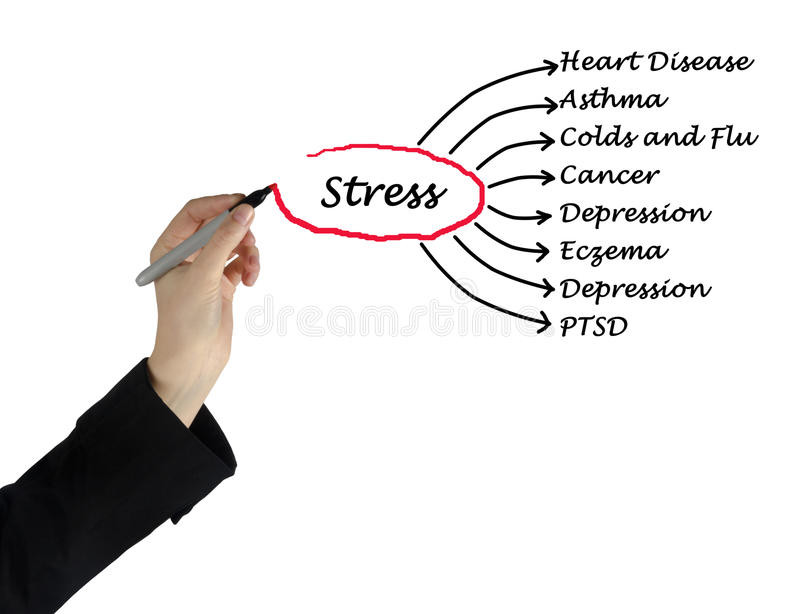The objective of this article is to identify symptoms of stress and their consequences to our lives.
Summary: We are all under stress daily. Without it we wouldn't be motivated toward anything. We need some stress but not an excess of it. This article explains the nature of stress, the symptoms that appear, and their effect on our bodies.

It makes some suggestions for dealing with too much stress.
Stress can be defined as the rate of wear and tear in the body OR any disruptive influence on a person, physical or psychological that: threatens us, scares us, pushes us, worries us, or excites us. Stress speeds up, keys up, or tenses our bodies.
Since stress occurs daily, we need to learn to recognize when too much stress becomes unmanageable and we need to take action to diminish its effects.
Physical stress occurs from injury, viruses, extreme temperature change, a foreign body, exhaustion, other irritants. psychological stress comes in the form of a threat to our security, self-esteem, way of life, or safety.
Threats produce fear and especially fear of loss. Another major threat is uncertainty. Change produces the uncertainty--certainly, a major part of most lives today.
The combination of change and loss produce great amounts of stress. There is a scale which assigns a point value to the major experiences of life which cause stress. At the top of that list are: Christmas, death of a spouse, divorce, loss of a job, severe illness, and, going down the list, even vacations. That is to say, happy events can cause stress as well. However, we need to recognize the demands on the body and adjust ourselves to it.
So how do we know that we are stressed?
The first stage is the going into action of the body's defenses. Messages from the nervous system reach the hypothalamus gland which notifies the pituitary gland and adrenal glands. Then the pituitary-adrenal system pumps hormones (Adrenalin) into the bloodstream. These hormones have the effect of speeding the heart rate, increasing respiration, and stopping digestive activity.
In animals and primitive man this alarm triggers physical action (fight) or running away (flight). This releases tension.
However, if there is no flight or fight then there is no release of the hormones. this kind of situation can lead to ulcers, backaches, palpitations, rashes and various other ailments. Basically, this hormone released during the alarm phase, the Adrenalin can make us feel bad. It is the opposite of Serotonin which is the brain hormone released under exercise which makes us feel good. This hormone is also released when we are enjoying ourselves. Adrenalin eats up Serotonin. Without release, it makes us feel bad.
Resistance and Adaptation is the next phase of stress.
In this stage, whatever is seen as the attacker is fought off and some adjustment is made. If we are tired, we sleep. If hungry, we eat. This defense system works so well that most of the time we are unaware of it. We get bombarded by outside hostile forces all the time but we don't get sick.
It is only when defense systems break down , being bombarded over time, that illness results.
The third step to stress is exhaustion.
The body cannot be stressed all the time. Release must occur. It is a popular tenant that illness is the result of stress--90% of it. This is the interaction of a hostile condition with stress could well cause the immune system to weaken opening up the body to many maladies.
Physically the hormones released by fear cause muscles to tense and blood to flow to prepare for action. If action is called for, the body uses its extra readiness, rests, and returns to normal. However, if the action is repressed, then the body is keyed up and the symptoms of stress result.
These symptoms may be tense muscles, insomnia, fatigue, boredom and depression, excess drinking, using food for comfort or not at all, digestive upsets, heart palpitations. Also, phobias, tics or restlessness,
How does one reduce stress? The first two issues are the recognizing of the situation and understanding how it all works. Next, for some, religion or a close identification with a group can be both empowering and calming. It is a good antidote to stress.
For others, a more personal approach to reducing stress is necessary. And, some people utilize both.
Many stressors can be avoided. Environmental stressors such as noise, crowded conditions or heavy traffic can be reduced with planning and awareness.
Possibly, a job change may be necessary.
Recognizing when something is out of one's control may help to calm attitudes. Re-evaluating one's talents and goals may be helpful. It is also useful to have a good grasp on what is changeable and what is not.
Next, relax. Try stretching and take short naps. EXERCISE! EXERCISE! EXERCISE! This is the best stress reducer of all! This is because of the release action of exercise on the hormones produced under the fight/flight phenomenon.
Sleep allows the body to restore itself. Avoid sleeping pills or tranquilizers. They tend to have depressive effects on the body.
Find some hobbies-any activity which you enjoy and which occupies your attention. This should be different from work. Last, think about public service. Try sharing your skills with others. Such activities produce Serotonin which is the brain hormone related to experiences of pleasure. The more "out of yourself" you can become, the better you are likely to feel.
When any of your symptoms are severe or prolonged, it may be the signal for outside help.
